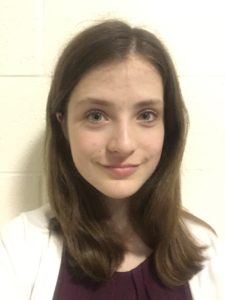![]()
 E-mail: ncasal@nd.edu
E-mail: ncasal@nd.edu
Language: Latin
Location of Study: Rome, Italy
Program of Study: Living Latin in Rome (Paideia Institute)
Sponsors: Nanovic Institute for European Studies, College of Arts and Letters, and the Center for the Study of Languages and Cultures
Blog URL: http://sites.nd.edu/sla2018/author/ncasal/
![]()
A brief personal bio:
Natalie Casal is a Program of Liberal Studies and Classics major from Atlanta, Georgia. In addition to her passion for dead languages, she has a passion for defending life— she will serve as the Elderly Commissioner of the Right to Life Club for the 2018- 2019 academic year. In the summer of 2018, after her Latin program, she will intern with the Pontifical Academy for Life. She is an intern at the Journal of Religion and Literature. An avid writer, she serves on the staff of The Irish Rover, an independent newspaper, and The Juggler, a student literary magazine. She is a proud member of the Snite Museum’s Student Programming Committee, and she works as a Digital Projects Assistant in Hesburgh Library.
Why this summer language abroad opportunity is important to me:
I am so grateful for the opportunity to study Latin in Rome this summer through a Summer Language Abroad Grant. I am looking forward to improving my proficiency in Latin, but I am also looking forward to bringing some vitality into my study of a dead language. In a classroom setting, sometimes it’s easy to forget that the writers I so admire lived and breathed, loved and fought. I want to get to know their hometown, the caput mundi, because I don’t think that writers can be separated from their context. I will recite Cicero in the Forum, Horace at the Fons Bandusiae, and Pliny on Mount Vesuvius; being in Rome will allow me to become as close as possible to the men and women separated from me by a language and 2,000 years.
What I hope to achieve as a result of this summer study abroad experience:
I hope to return from my summer abroad with greater speed and fluency in Latin translation. A good pianist doesn’t need to think about the names of the notes on a score; music is best read fluently, as a composite whole. In a similar way, I hope to minimize my habit of meticulous mental labeling of cases and grammatical structures. While grammar is important, it is a tool in the service of all-important truth and beauty. In short, I want to be able to read Latin, not just translate it. I have the dual goal of improving my skills of translation and uniting my classroom learning with the actual historical sites of Rome.
My specific learning goals for language and intercultural learning this summer:
1. By the end of the summer, I will have built up my skills of Latin translation so that a translation feels more like reading.
2. By the end of the summer, I will have broadened my vocabulary so that I am less dependent upon a Latin-English dictionary.
3. By the end of the summer, I will be able to summarize and discuss the main themes of Latin texts using spoken Latin.
4. By the end of the summer, I will have a full understanding of the historical contexts in which Roman authors wrote.